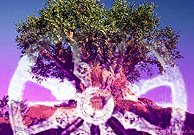
The second half of Sam Harris'
The End of Faith covers various aspects of consciousness and spirituality from a naturalistic perspective. Something I read recently in this has had me wondering again about the nature of consciousness. But first a recap and some background.
It would seem, for the naturalist, that brain function results in processes which bring about the subjective first-person experience of consciousness. This materialistic view implies, even demands, something which is quite amazing. If we know that consciousness can arise from the interplay of complex systems of matter, then there seems to be no special requirement that such a system be a human brain, or even a brain, or even biological. Absent the notion of a spirit or soul, the floodgates are opened and nearly any sufficiently complex system of a particular nature would have experience of consciousness.
Of course, to be conscious would seem to require more than complexity, but rather a certain sort of complexity. A sort where external data is 'modeled' or 'symbolized' in some way, and that data can be manipulated in meaningful and creative ways. There would also have to be a symbolizing of the functions doing the symbolizing in order to have self awareness.
But in Harris book, he points out two things I hadn't considered before about human consciousness. Brain scans and REM readings show that we dream nearly every night, but we don't always remember it. Consider a dream you remember. Certainly, you would say you were conscious during this dream, even if limited in some ways. Now consider when you awake in the morning and don't remember any dreams. Were you unconscious throughout the night, or were you conscious and simply don't remember it? Does your lack of memory of this period change the fact that you were indeed conscious when it happened?
The second thing Harris mentions is that there are cases such as brain damage, drugged states, infants, and simpler animals where there is no self awareness - no sense of 'I'. Yet, there certainly seems to be an experiential first-person consciousness of one's environment.
What both of these examples made apparent to me, was that memory is distinct from the first-person qualia of consciousness, as is self awareness. There is a sense of 'what it is like to experience things' and this sense can occur in the brain even when there is no memory involved and even when there is no sense of self involved.
This notion greatly expands the possibility that there is 'something it is like' to be other complex systems besides brains. Unlike my previous assumptions, I am no longer certain that a complex system need have a system for storing data representing externals (memory) or that it need have a system which codes for its own internal functions (sense of self), in order for it to experience qualia. Consciousness may be a basic quality that exists on a spectrum, inherent in the universe wherever highly localized concentrations of causal interactions take place.
But what would it be like to experience qualia and not keep a running memory of it? What would it be like to experience qualia without a sense of self? Certainly, whatever we are talking about here in other natural systems is no personified being or entity, but rather something more basic - perhaps even too alien for us ever to truly relate to directly. Nevertheless, the possibility that ecological systems, computer systems, or even cosmological-scale systems may be having some sort of 'experiences' is a tantalizing notion.
I am not claiming, necessarily that other complex systems
do have first-person experiences of qualia. Merely, I am stating that given these two realizations about our own brains, it now seems much more reasonable a possibility to me than it did before. The variety of complex systems which might (might) experience qualia seem to me now to be possibly much more broad and diverse in form and function than I would have suspected previously.
Picture taken from StephenWolfram.com
 Today's entry is from my wife, Julie, and touches on how our focus determines our reality. A view shared by Marcus Aurelius, Buddha, and Qui-Gon Jinn. Thanks Julie!
Today's entry is from my wife, Julie, and touches on how our focus determines our reality. A view shared by Marcus Aurelius, Buddha, and Qui-Gon Jinn. Thanks Julie!






